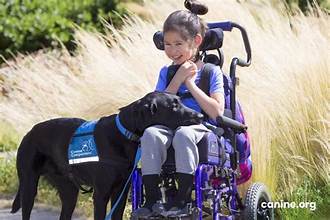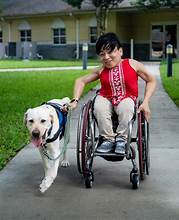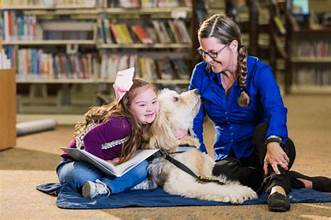🌟 Why These Children Benefit So Much from Service Animals
Children with neurological or developmental conditions often face challenges that affect mobility, communication, daily living skills, or safety awareness. A specially trained service dog can offer practical support, emotional comfort, and life-changing companionship, improving not only the child’s life but also the family’s peace of mind.

Conditions that may qualify a child for a service dog include:
- Cerebral palsy (CP)
- Down syndrome
- Epilepsy
- Developmental delays
- Spina bifida
- Traumatic brain injury (TBI)
🐾 What Tasks Can a Service Dog Perform?
Depending on the child’s diagnosis and abilities, service dogs can be trained to help with:
🧍♀️ Mobility Support
- Assist with balance while walking.
- Retrieve dropped items
- Open doors with adaptive tools
- Push wheelchair buttons or carry light items.
⚡ Seizure Response or Alert
- Stay beside the child during a seizure
- Alert caregivers when a seizure begins
- Trigger a medical alert device.
- Retrieve medication or alert others for help.
⏰ Daily Living Assistance
- Help with dressing routines
- Carry school items or backpacks.
- Turn lights on/off
- Nudge a child to transition from one activity to another.
💙 Emotional & Social Support
- Reduce anxiety in new or loud environments
- Help with routine and structure.
- Encourage peer interaction through shared interests.
- Act as a calming presence in medical or school settings
🐶 “Our daughter has cerebral palsy, and her dog helps her feel brave at school. He picks up her pencil when she drops it and makes her classmates curious—instead of staring, they ask questions and make friends.”
🏫 School Access and the ADA
If the dog is trained to perform specific tasks for the child, they are protected under the Americans with Disabilities Act (ADA) and allowed in:

- Public and charter schools
- Libraries, restaurants, and stores
- Public transportation and airports
Schools may ask only:
- Is the dog required due to a disability?
- What task(s) is the dog trained to perform?
They cannot ask about the child’s diagnosis or request certification or medical paperwork.
👩⚕️ Choosing the Right Service Dog for Your Child’s Needs
The right service dog should be:
- Patient and calm in unpredictable environments
- Large enough to assist with mobility (if needed)
- Responsive to commands and deeply bonded with the child
- Trained through a reputable program or by a qualified trainer
Many organizations pair dogs to fit the unique needs of children with CP, epilepsy, or cognitive delays.
💰 Cost & Funding Help
Service dogs can cost $15,000–$40,000+, but many programs offer:
- Grants or fundraising guidance
- Nonprofit sponsorships
- Sliding-scale placements
- Military or disability-specific funding
Look into trusted groups like:
- 4 Paws for Ability
- Canine Companions
- Little Angels Service Dogs
- National Seizure Response Service
📥 Free Printable for This Post:
“Top 10 Tasks a Service Dog Can Perform for a Neurologically Disabled Child”
Includes a visual checklist, ideal for IEP meetings or therapist consultations.
Let me know if you’d like this in Canva, PDF, or both!
🔑 Final Thoughts
Children with neurological or developmental disabilities face unique challenges, but a well-trained service dog can empower them to live with more confidence, safety, and connection. These dogs become more than helpers; they become trusted companions that help children reach milestones they might otherwise miss.




